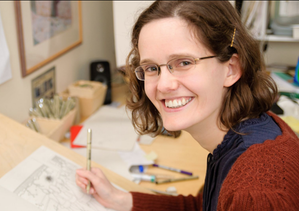
Katie Green is a U.K. author and illustrator. Green grew up in the London suburbs and moved to Bristol in 2002 to study, where she stayed for 10 years and recultivated her love of drawing. Her debut book, the graphic memoir Lighter Than My Shadow (Lion Forge), took almost five years to complete and chronicles her descent into--and recovery from--disordered eating and sexual abuse. Green now lives in Devon with her partner and their rescue dog, Jack.
Had you always wanted to illustrate your memoir?
No, I initially thought it was going to be prose--I was that person who thought that comics were for people who couldn't read proper books. When I was a kid, I wanted to be an illustrator of children's books and that's how I came to illustration in general. I picked up The Red Tree by Shaun Tan and thought I had this completely original idea to do a picture book for adults. I started telling my friends what I wanted to do and, when they gave me graphic novels, this whole world opened up to me. When I read my first graphic novel, it all fell into place. I thought, "This is what I need to do."
The illustrative depiction of the illness is very powerful. How did you come to this imagery? How did you make it visual?
It was a really slow evolution. I started drawing to express to my parents how I was feeling. I originally drew the eating disorder as a giant green monster erupting out of my head. That was my starting point. When I decided to do the book for real, that was the metaphor that I went to. I did a lot of sketching and painting and collaging trying to evolve the idea and I went through all kinds of iterations until I just did a little scribble on the page. And that's the picture that ended up on the spine: the girl on the scale with a little cloud over her head. The moment I drew it, I knew I had found it.
And the mouth on the stomach... that shows the transition from seeing the illness as something that was outside of me and some kind of enemy to realizing it was inside and part of me; that it was myself I had to face.
How did it feel creating this work?
It felt visceral. It got to a point where I wasn't analytical about it. I wasn't thinking about how I was expressing it. I was back in that moment expressing it raw and it felt really right creating it like that.
There gets to be this point where the illness is tedious--the reader gets sick of dealing with this illness and gets sick of dealing with her. Did you do that on purpose?
I really wanted to get across that this takes a long time--I wanted to get across the monotony of having to get up and face the same thing every single day. And it takes a long time to change the addictive thought processes. I would think, "I know better than this now. Why am I still struggling with this?" I wanted to be completely real about how long it takes but offer some kind of hope that it's worth it. The same with the abuse--I really wanted to put it in the story and show that I was able to have something that might vaguely be considered a normal relationship afterwards. That was a big fear of mine, that I would never be able to be close to someone. It's not perfect. It's hard. But it's possible.
Is this a story that you always wanted to tell?
Almost as soon as I was diagnosed with anorexia, I knew I wanted to express it somehow. I couldn't find a book that resonated with me, really. I found one but it suggested that the eating disorder would always be there in the back of my mind and I was dissatisfied with that narrative. Telling my story became my reason for getting better, my ambition, my thing that I wanted to do, my focus. The thought of creating the book is what got me through recovery. I thought, "I can't write this book if I die. So I've got to at least stick around for that long and then I can reassess the situation."
So you knew that you wanted to tell this story before you recognized your history of sexual abuse?
Yes. The abuse in fact happened after I had decided I wanted to make a book. So that just screwed everything up and made it a lot more complicated. But then it made me even more certain that I wanted to tell my story. I was chosen and preyed upon because of my vulnerability. And that's what happens. I realized that if I wanted to make this book real, I couldn't leave the abuse out. I couldn't tell a truthful story without including it.
How does it feel to promote this work, which shows some of the worst things that have happened in your life?
In one sense, it's really weird. Because I've had to do a lot of work in therapy about moving on from this being my identity, and the only thing I talk about. And yet, by the decision to write about it and the book being recognized as successful, I have to talk about it and people perceive it as my identity.
But I had this moment this morning and it's the first time I've really taken it in... I turned all of this really horrible stuff in my life into something really positive. For myself. Regardless of what anyone else thinks of it. I just really took it in for the first time: this turned out alright. --Siân Gaetano

